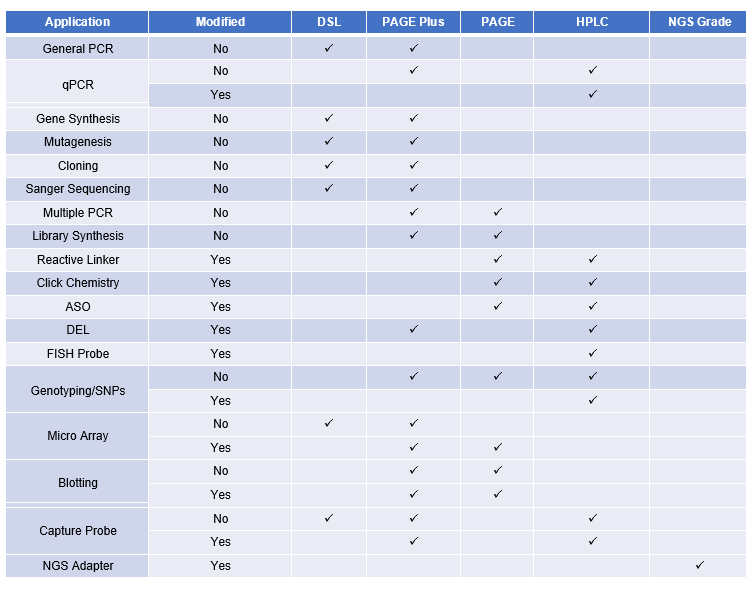Oligonucleotide synthesis refers to the chemical synthesis of single-chain, short fragments via solid-phase phosphite amides. The synthesis of each base requires four steps: deprotection, activation and coupling, acetyl closure, and oxidation stability. Due to efficiency problems with the chemical reaction itself, the crude products cannot reach 100% purity. In addition to the target sequence, short error fragments and impurities will also be generated during the synthesis process, which will affect the experimental results as well as the progress of the project.
On one side, synthesis efficiency has a great influence on the purity of crude products; the higher the synthesis efficiency, the higher the purity of the crude products. Through our strict selection of raw material suppliers, instrument performance testing, large-volume DMT detection, purity analysis, mutation rate monitoring, and other strict intermediate process controls, Synbio Technologies’ oligonucleotide synthesis ensures an average synthesis efficiency of more than 99%.
Purification is also a key step in oligonucleotide synthesis. Informed selection of different purification methods can make your experiments more efficient. The main factors that should be considered during purification method selection are application direction, purity, sequence length, special modifications, cycle, cost, yield, etc. Synbio Technologies can customize targeted purification programs according to specific oligonucleotide application directions. We help promote your downstream research by providing reliable, high-purity oligonucleotide products while using the most cost-effective purification method.
DSL Purification
The traditional purification method is to use a C18 purification column to specifically adsorb oligonucleotides and then elute with ddH2O to effectively remove salt impurities. Synbio Technologies uses gas-phase methods to cleave and elute crude products from solid-phase CPGs, followed by a portion of the organic phase to remove salts.
Advantages: High throughput, high efficiency, short cycle, low cost.
Disadvantages: Difficult to effectively remove short segments.
Suggestion: It can be used for short chain or low-purity oligonucleotides.
PAGE-Plus Purification
Purification is carried out on a reversed-phase column using a protective group (DMT) retained on the last base and specific adsorption. Then, the impurities without DMT will be removed because there is no specific adsorption.
Advantages: High throughput, high efficiency, short cycle, cost-effective.
Disadvantages: The removal efficiency of short fragments above 60nt decreases gradually.
Suggestion: It can be used for high-purity oligonucleotides within 60nt or long-chain oligonucleotides.
HPLC Purification
High performance liquid chromatography purification is one of the most effective methods for DNA purification, which can achieve high purity and sensitivity. The most commonly used method is reverse-phase HPLC, and the purity of oligonucleotides can reach more than 90% after purification.
Advantages: Automation, high purity, excellent performance for modified oligonucleotides.
Disadvantages: High cost, average efficiency.
Suggestion: It can be used for high-purity oligonucleotides and modified oligonucleotides.
PAGE Purification
Under a certain electrical field strength, oligonucleotides are separated by length via denaturing polyacrylamide gel electrophoresis. Synbio Technologies uses specific gels that allow one-base difference separations.
Advantages: It can remove short-chain oligonucleotides during the synthesis process, performs well for long-chain oligonucleotides (>59nt) or oligonucleotides with high quality requirements, and the purity can reach more than 95%.
Disadvantages: Low efficiency, low output, complex operation.
Suggestion: It can be used for high-purity oligonucleotides or long/ultra-long chain oligonucleotides.
NGS Grade Purification
NGS research places high demands on the quality of oligonucleotide materials. Synbio Technologies focuses on the improvement and optimization of production and purification processes for NGS applications, which can minimize the impact of purity and exogenous interference.
Advantages: High quality, anti-external interference.
Disadvantages: Long cycle, complex operation, high cost.
Suggestion: It can be used for adapter/index or the oligonucleotides without exogenous interference.
Competitive Advantage
High Quality: Strict implementation of ISO9001 and ISO13485 quality management system production standards.
Expertise in Oligonucleotides Synthesis: With more than 15 years of industry experience, we can provide professional technical support.
Fast Turnaround Time: Online orders accepted and processed 24/7.
Related Services
Custom DNA Oligos
Diagnostic Probes & Oligos
NGS Oligos
Modified Oligos
Antisense Oligonucleotides
CpG ODNs
 DNA Synthesis
DNA Synthesis Vector Selection
Vector Selection Molecular Biology
Molecular Biology Oligo Synthesis
Oligo Synthesis RNA Synthesis
RNA Synthesis Variant Libraries
Variant Libraries Genome KO Library
Genome KO Library Oligo Pools
Oligo Pools Virus Packaging
Virus Packaging Gene Editing
Gene Editing Protein Expression
Protein Expression Antibody Services
Antibody Services Peptide Services
Peptide Services DNA Data Storage
DNA Data Storage Standard Oligo
Standard Oligo Standard Genome KO Libraries
Standard Genome KO Libraries Standard Genome Editing Plasmid
Standard Genome Editing Plasmid ProXpress
ProXpress Protein Products
Protein Products

























